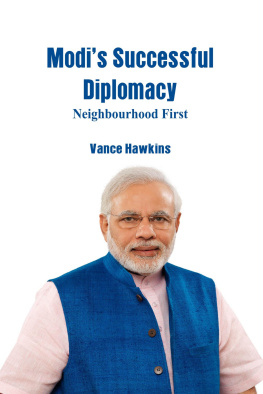Modi's Successful Diplomacy
Modi's Successful Diplomacy
Neighbourhood First
Vance Hawkins
Alpha Editions
Copyright 2018
ISBN : 9789352978618
Design and Setting by
Alpha Editions
(A Vij Publishing Group Company)
www.vijbooks.com
email
All rights reserved. No part of this publication may be reproduced,
distributed, or transmitted in any form or by means, including
photocopying, recording, or other electronic or mechanical methods,
without the prior written permission of the publisher.
The views and characters expressed in the book are of the author and
his/her imagination and do not represent the views of the Publisher.
Indian Prime Minister Narendra Modis charismatic personality and determined push for Indias economic development have made him immensely popular at home. Modis foreign policy initiatives are driven as much by his governments domestic political strength as by Indias rising concern over rapid expansion of Chinas economic clout and military might in Asia. Three years since then, though, a lot has happened.
Indo-Pak relations have seen a roller coaster ride. From inviting Nawaz Sharif to PM Modis oath taking ceremony to Modi paying an impromptu visit to Pakistan on Nawaz Sharifs birthday, from the Pathankot attack to Uri Attack, from Pakistan backed terrorism in Kashmir valley to the LoC surgical strikes, the list goes on. Meanwhile, China is making headway in wooing Indias neighbours. Clearly, Neighbourhood First is turning into Neighbourhood Lost.
The neighborhood first policy is the striking feature of Modi governments diplomatic approach. In his governments strategic imagination, Indias relations with neighboring countries must receive topmost priority. If India does not resolve its differences with its small neighbors, it will only pave the way for China to exert growing influence in the region. Indias relations with China have not shown much improvement in the last three years.
Today, India's neighbourhood is at the cusp of major political and economic transitions. While Bangladesh -- despite political and security challenges -- is showing signs of economic resurgence, Sri Lanka democratically voted in its Prime Minister Ranil Wickremesinghe in 2015 and Nepal adopted its new Constitution.
Russia, once considered to be India's all-weather ally, seems to have been drifting away and tilting towards Pakistan. Writing on this issue, India's strategic expert C Raja Mohan said, "As Russia conducts its first ever military exercise with the Pakistan Army... Delhi has to reckon with the prospect that Russia might not necessarily remain India's best friend forever. Rethinking Russia's position in India's strategic calculus will be heart-wrenching for many in Delhi."
Mr. Modi had received Chinese President Xi Jinping in September 2014 in Gujarat reflecting his personalised diplomacy even though the ongoing stand-off in Chumar in eastern Ladakh cast a shadow on the visit. The personalised diplomacy was reciprocated the following year when Mr. Modi visited China and Mr. Xi received him in Xian, but its limits soon became apparent.
In mid-2016, China blocked Indias bit to join the Nuclear Suppliers Group (NSG) despite a meeting between the two leaders in Tashkent on the margins of the Shanghai Cooperation Organisation (SCO) summit. This was followed by China vetoing Masood Azhars listing as a terrorist in the UN Security Council even though the Jaish-e-Mohammed (JeM) is a banned entity. Chinas veto continued even after the Uri Army camp attack by JeM cadres later that year, adding to Indias growing annoyance. Hydrological data sharing stopped amid reports of diversion of Brahmaputra river waters. The 73-day stand-off at Doklam last year and accompanying rhetoric reflected a marked downturn. India responded through all this by voicing scepticism regarding Mr. Xis Belt and Road Initiative (BRI), stepping up maritime engagement with the U.S. and Japan and reviving the Quad (with Australia) in Manila last year.
This is a reference book. All the matter is just compiled and edited in nature, taken from the various sources which are in public domain.
This book highlights that in the past three decades, due to the constraints of coalition politics, there has been little insight into Indias foreign policy.
Editor
Grading India's
Neighborhood Diplomacy
Indian Prime Minister Narendra Modis charismatic personality and determined push for Indias economic development have made him immensely popular at home. Modis foreign policy initiatives are driven as much by his governments domestic political strength as by Indias rising concern over rapid expansion of Chinas economic clout and military might in Asia.
Indias rise is taking place in the shadow of Chinas even more dramatic rise. Chinas assertive, and often aggressive, behavior has been viewed as a huge challenge for India because it opens up the likelihood of China dominating Indias immediate neighborhood. By focusing a great deal of energy in the neighborhood, the Modi government is demonstrating that India has the capability to promote regional peace and economic integration. Rather than merely complaining about external intervention in South Asia, New Delhi is developing a regional strategy based on Indias natural geographical advantages, economic complementarities, shared cultural heritage, and preeminent strategic position. Modi is perfectly aware that New Delhis ability to deal with Washington and Beijing can be significantly enhanced if India achieves greater strategic confidence in South Asian geopolitics.
The neighborhood first policy is the striking feature of Modi governments diplomatic approach. In his governments strategic imagination, Indias relations with neighboring countries must receive topmost priority. If India does not resolve its differences with its small neighbors, it will only pave the way for China to exert growing influence in the region.
Modi often projects himself as an innovative and decisive leader who could make things happen. True to his style, he began his term as prime minister with a diplomatic first by inviting the leaders from the South Asian subcontinent to attend his inauguration in May 2014. After his first two years in office, Modi had already traveled to almost all of Indias neighbors in an attempt to establish India as a dominant regional power. His successful visits to South Asian capitals indicated that finally India had a leader for whom neighborhood first was not mere political rhetoric but a strategic necessity.
SRI LANKA
Sri Lanka has long been in Indias geopolitical orbit, but its relationship with China has strengthened in recent years. As Western countries accused former President Mahinda Rajapaksa of gross human rights violations during the final stages of the civil war with LTTE, China extended billions of dollars of loans to the Sri Lankan government for new infrastructure projects, though these loans turned out to be economically unviable for the island nation.
In February 2015, Sri Lankas newly elected President Maithripala Sirisena undertook his first official visit to India, and Modi paid a return visit to Colombo in March 2015. He was the first Indian prime minister to do a stand-alone visit to Sri Lanka in 28 years. While there, Modi not only addressed the Sri Lankan parliament but also made a trip to the northern province of Jaffna. Modi visited Sri Lanka again in May 2017, when he inaugurated a specialty hospital built with Indian assistance and visited the Indian-origin Tamil community there.
Just ahead of Chinas Belt and Road Initiative (BRI) summit in May 2017, Colombo refused to allow a Chinese submarine to dock. Under the previous dispensation, Sri Lanka had allowed a Chinese submarine to dock at the Colombo port, drawing protests from India. But Sri Lanka also sent its Prime Minister Ranil Wickremeshinghe to the Belt and Road summit, and was offered an estimated $24 billion in additional loans.











